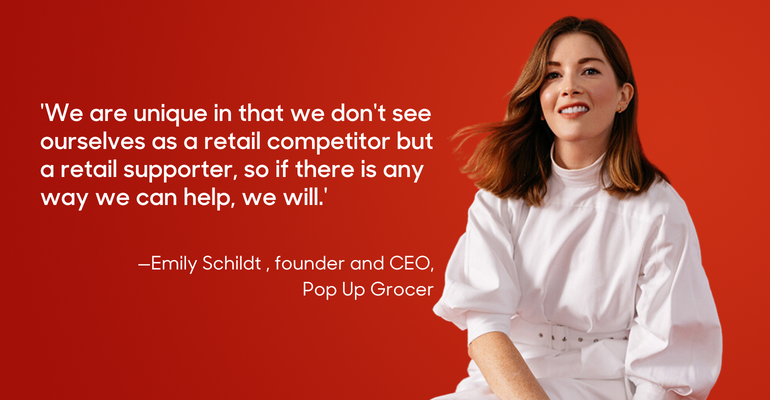July 13, 2023

In the Summer edition of Natural Foods Merchandiser, we highlight four independent retailers who operate differently. This is the first installment of our Reimagining Retail series.
 Independent natural products retailers have always been trailblazers, dating back to when selling organic produce, bulk grains and herbal supplements was novel. Today, many are reinventing retail itself, breaking out of the traditional confines and finding innovative ways to connect with and serve consumers, promote healthy lifestyles and practice sustainability.
Independent natural products retailers have always been trailblazers, dating back to when selling organic produce, bulk grains and herbal supplements was novel. Today, many are reinventing retail itself, breaking out of the traditional confines and finding innovative ways to connect with and serve consumers, promote healthy lifestyles and practice sustainability.
Every new natural product brand hopes for that big break—a bona fide chance for consumers to discover its offerings, fall in love with them and become loyal customers. But with retail shelves notoriously jam-packed and online audiences increasingly fragmented, such kingmaking opportunities can be scarce.
Veteran CPG leader and marketing guru Emily Schildt empathizes with emerging brands striving to be seen, so she's doing something to help. Her ingenious retail venture, Pop Up Grocer, establishes temporary stores in major cities across the U.S., each stocked entirely with innovative new natural, nutritious and sustainable products from promising young brands.
Building off of the popups' success, Schildt opened the first permanent Pop Up Grocer earlier this year in New York City. We chatted with her recently to get the full scoop on her innovative business model.
What led you to launch Pop Up Grocer?
Emily Schildt: I've worked in the CPG space for the entirety of my career. I was an early employee at Chobani, worked closely with the founder and led the digital marketing team for a few years, back when the company was growing at record speed. That's where I caught the bug for working with emerging brands and being an entrepreneur. That set me on the path of this crazy life.
Shortly thereafter, I started my own brand marketing consultancy, Sourdough. For eight years, I helped emerging food companies, usually at the point of launch, to form their brand identity, social voice and digital presence while they perfected their product. During that time, I got the idea for Pop Up Grocer.
What was that idea exactly?
ES: The idea was to provide exposure and visibility for emerging brands. During my consultancy, I got a peek behind the curtain at the challenges brands face when first trying to enter retail. For mass retailers, it could be anywhere from one to two years or more from the point of first talking with the retailer to getting on shelf. We wanted to create an efficient path to market for these brands, a physical space where people could experience their product, and particularly influential people: early-adopter consumers, press, buyers, retailers and investors.
To date, we've had nine popups in seven cities. The first, in New York, was 10 days, whereas all that came after were 30 days. That first store was a trial for this idea, and we got between 100 and 150 brands to participate. We carried about 400 products, which is what we've offered in our popups ever since. Then on March 3, we opened our first permanent store.

Is Pop Up Grocer these brands' first foray into retail?
ES: For about 10% of our brands, we are their first shelf ever. But for the large majority, we are their first shelf in that particular market. That's the primary motivation to work with us—brands want to test Dallas, for example, or New York. They want to get sales data to validate that venture, or they want to advertise in that market to support getting into Whole Foods later on. The remaining 20% of brands have greater distribution but are showcasing a new product with us.
What are your product criteria?
ES: Our concept is unique in its advertiser-first model, but also in our product offering: We are exclusively new and better-for-you. And beyond that, we prioritize brands from founders who are underrepresented and under-resourced, and [we] provide accommodations for them specifically.
How do you find brands—or do they find you?
ES: It's a bit of both. We have a long pipeline of brands interested in working with us, and for that, we are so grateful. One reason we established the permanent space is we have more demand than we could satisfy with just three or four pop-ups a year. We get lots of submissions on our website daily. Finding new brands is the thrill and the fun for us. We still spend a lot of time poking our heads in boutique stores in different cities and searching the internet, in the depths of Instagram and TikTok.
Are the brands all retail ready or do you help them become ready?
ES: They are retail ready. I wish we had the ability to work more closely with earlier-stage brands, but we're a four-person team, so we just don't have the bandwidth. That also offsets any risk for us as a small company. That said, in 2020, we launched the Pop Up Grocer Fund, which rewards one emerging brand and its founder, on an annual basis, with cash, services and placement. We've also had a giveback component since the onset, giving 5% of sales at our popups to a charitable organization.
Congrats on the flagship store! What's that space like?
ES: We have a corner location in downtown Manhattan. It's a three-part concept: one part grocery, with products on rotation every three months; one part café, with a full coffee bar and baked goods offering, which will evolve and expand over time; and one part a space for tastings, talks, panels, you name it.
Does your business also have an online component?
ES: We don't have a mirrored marketplace online, but we offer a subscription box. For $39—which includes shipping, so it's a real steal—you get six to eight items from the existing rotation.
Anything else we should know about Pop Up Grocer?
ES: We really see ourselves as an advertiser for these brands before we see ourselves as a store. Of course, we are both, and as we increase our footprint with the permanent store, we will become more of a store as compared to the past. Still, I encourage retailers to reach out if they'd like to learn what brands we're looking at or what brands are finding success with us. We are unique in that we don't see ourselves as a retail competitor but a retail supporter, so if there is any way we can help, we will.
About the Author
You May Also Like
.png?width=700&auto=webp&quality=80&disable=upscale)



